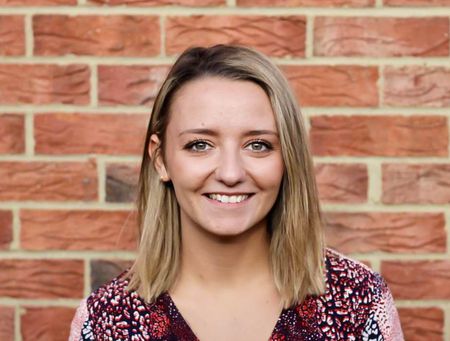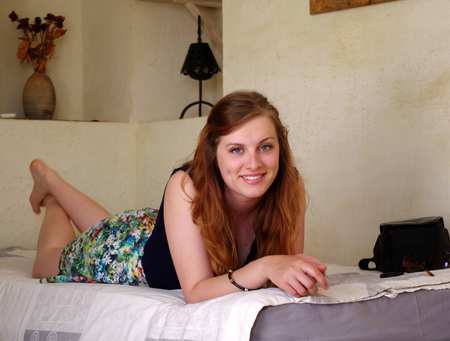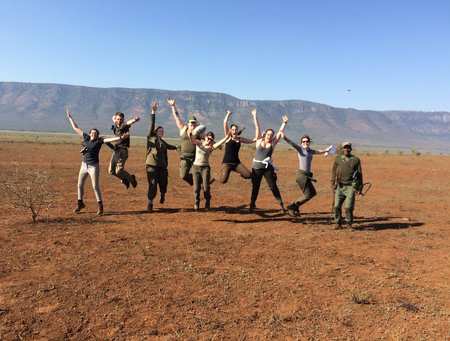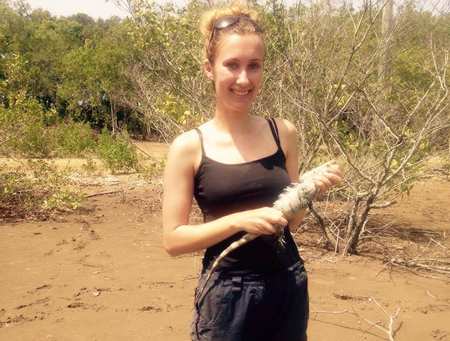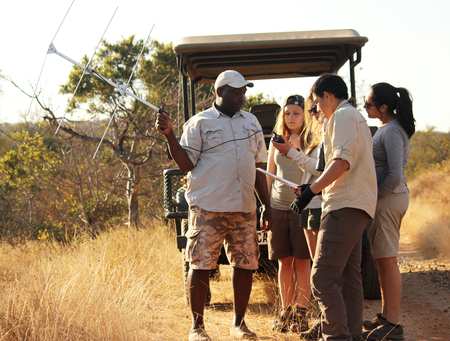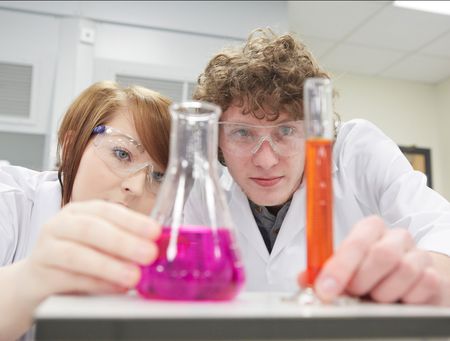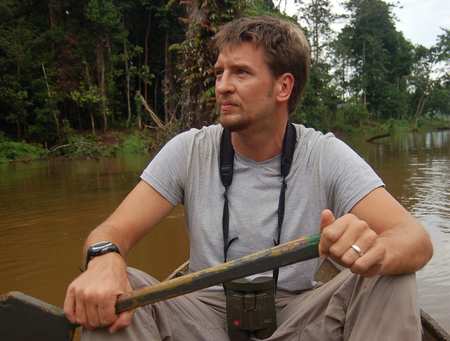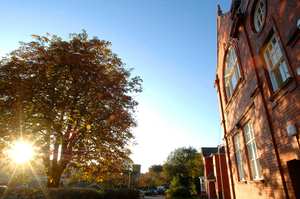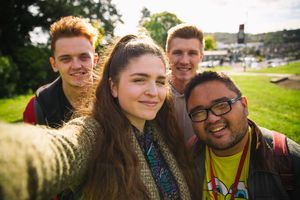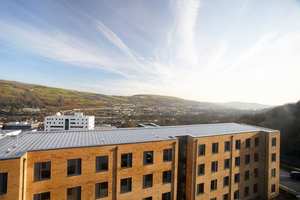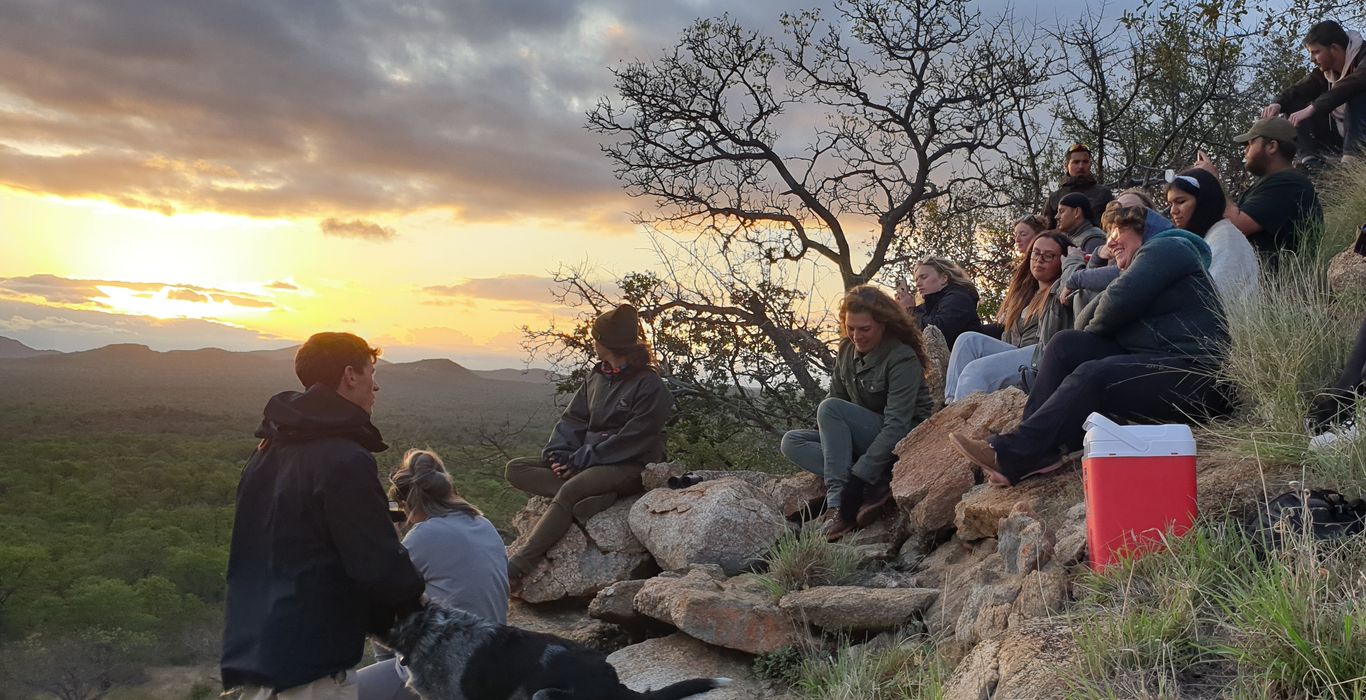
BSc (Hons) International Wildlife Biology
Wildlife biology is the study of organisms, their behaviour, ecology, environment and management. On USW's unique International Wildlife Biology degree, you will study and interpret the biological processes and interactions that determine species diversity and distribution, their responses to biotic and abiotic factors, and apply current scientific thinking and practices to wildlife biology research and management in globally changing landscapes.
There is a strong practical field element to the course, providing opportunities for immersive learning on three continents. You will study the wildlife and habitats of different landscapes in South Africa, which is a compulsory component of the course. You will also develop your scientific skills on UK field trips, and have the option to apply research techniques in the tropical forests and coral reefs of Asia or Central America.
Typical study subjects include wildlife management, conservation genetics, ecology, vertebrate zoology, and aquatic biology.
Year One: International Wildlife Biology Degree
- Principles of Ecology
- Wildlife Biology
- Biodiversity
- Skills and Professional Development 1*
- Diversity of Cellular Life
- Genetics and Evolution
*This module can be studied in Welsh.
Year Two: International Wildlife Biology Degree
- Comparative Vertebrate Zoology
- Patterns and Processes in Biodiversity
- Conservation Genetics
- Behavioural Ecology
- Skills and Professional Development 2*
*This module can be studied in Welsh.
Optional (one of three):
- Ecological Consultancy
- Applied Tropical Conservation
- Professional Practice and Placement
Year Three: International Wildlife Biology Degree
- Research Project & Career Development
- Functional Ecology
- Aquatic Biology
Optional (two of three):
- Global Ecological Challenges
- Humans and Other Primates
- Applied Conservation Management
Teaching
The International Wildlife Biology degree is taught through a combination of lectures, tutorials, laboratory sessions, computer exercises, practical classes, and UK and overseas fieldwork.
The number of hours of direct teaching you will receive per week will vary depending on the modules studied and year of study. Generally, you will have 48 hours of direct contact per (20-credit) module over an academic year, equating to around 12-15 contact hours per term week. Outside of this time, you will be expected to commit around 80 hours to study guided by your lecturers and self-directed learning on each module (but more for your third year project). A further 70+ hours are normally required for students to prepare and complete assessments for each module. Residential field courses have more contact hours, supporting our hands-on approach to field learning.
Our International Wildlife Biology degree is practically oriented, and you will have opportunities to develop your practical skills, understanding and application by participating in our residential field courses. Current field course destinations include South Africa (4 weeks), which is a compulsory element of our degree program, and our tropical ecology field course in Mexico (2 weeks, optional).
Throughout your wildlife biology course, we invite guest lecturers from the ecological and conservation sector to help support your knowledge and understanding of contemporary wildlife biology scenarios. This is also a great opportunity to meet with potential employers, along with field trips and collaborations on third year projects.
Research-informed teaching
We are a research-active team. Our Wildlife Ecology research focuses on three main areas: Tropical ecosystem challenges; Upland landscape ecology and Biodiversity conservation. We investigate species, population and community relationships with anthropogenic drivers of change to biodiversity, ecosystems, and the provision of co-beneficial goods and services. Our outcomes inform conservation and restoration options, processes and policies that remediate impacts of anthropic activities. We undertake and support field research in the Azores, Costa Rica, Honduras, Indonesia, Ireland, Mexico, Pakistan, the Philippines, South Africa and the UK.
Assessment
You will be assessed using a combination of different assessment types, to support all facets of your learning and development. These include scientific reports and papers, oral presentations, critical reviews, digital outputs, problem solving and data analysis tasks, in-class and online tests, laboratory exercises, practical competencies, field reports and written examination.
Assessment methods vary depending on the module and year of study. A number of modules are assessed through coursework and written examination, while other modules are continuously assessed with coursework only.
The breakdown of assessment methods for this course is: 9-27% practical assessment, 19-59% coursework, and 32-54% written examination.
Accreditations
The BSc (Hons) International Wildlife Biology degree is accredited by The Royal Society of Biology for the purpose of meeting in part the academic and experience requirement for Membership and Chartered Biologist (CBiol).
Accreditation confers a number of benefits. The course and University benefit from recognition of academic quality, the external review of programmes by a relevant authority, sharing of best practice, and enhanced recruitment opportunities. Students and graduates benefit from enhanced employability prospects, greater competitiveness in the job market, and a free one-year membership to RSB upon graduation. Prospective students are assured on the quality of the degree, and employers are assured of the level of employability skills and relevant knowledge provided by the degree.
Placements
The Professional Practice and Placement module provides students in the School of Applied Sciences with the opportunity to work with a commercial/industrial employer or on a simulated employer placement. Physical placements will be situated within an employer setting, whilst simulated placements will entail distanced work on a live project or brief. Placements will be offered by the University or arranged by individual students. This process is supported by our professional services team.
Field Trips
Our International Wildlife Biology degree is practically oriented and you will have opportunities to further develop your practical skills, understanding and application by participating in our residential field courses. Current field course destinations include South Africa (4 weeks), which is a compulsory element of our degree program, and our tropical ecology field course in Mexico (2 weeks, optional). Additional costs apply to both these field courses.
Our South Africa field course takes place in private nature reserves located in different ecological biomes – grasslands and savannahs – and is designed to provide an immersive experience of the biodiversity of Southern Africa. You will study the wildlife and ecology of these regions using a range of field and research skills and techniques, including interpretation of tracks and signs (game tracking) and species identification, behavioural studies, and biodiversity and habitat assessments, and apply these to scientific studies and wildlife conservation management scenarios.
A similar philosophy is applied to our Mexico field course, but here the focus is on tropical forests and marine systems, e.g. coral reefs, where you will have the opportunity to apply your scientific knowledge to mini research projects alongside local practitioners. Please note, the exact locations of our overseas field trips may vary each year, and are based on an area’s ongoing suitability for teaching and learning, and the overall cost of the trip.
The International Wildlife Biology course includes modules with significant fieldwork elements, which come with certain physical demands. All applicants are encouraged to attend a University Applicant Day to discuss the field courses with our staff, including current additional costs and the nature of the activities that are undertaken.
Facilities
By studying International Wildlife Biology, you will benefit from the huge investment in scientific teaching and learning facilities that has taken place at our Glyntaff Campus. Most of your campus-based teaching will take place here, and includes our fully-equipped purpose-built laboratories, computer rooms with specialist software to support your learning.
You will have the opportunity to gain additional qualifications that will enhance your career opportunities, such as the industry-standard ESRI certificate Learning ArcGIS Desktop, and a PADI Open Water diving qualification.
Featured Lecturer:
Dr David Lee
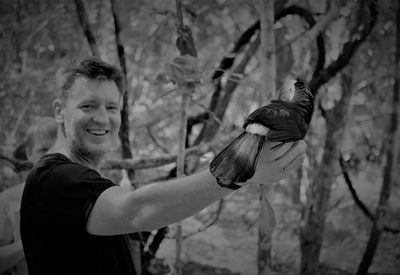
Dr David Lee is a wildlife ecologist and conservation biologist with academic and research interests that include the application of biodiversity survey and analytical techniques to evaluate avian and mammalian species and community responses in modified landscapes, particularly in tropical forest and UK upland ecosystems, and inform stakeholder-driven conservation and restoration management strategies.
He has developed and delivered multidisciplinary forest-based conservation research projects in Indonesia, the Philippines, China, Pakistan and Peru.
Dr Lee is a member of the IUCN SSC Bear Specialist Group, focusing on conservation research on sun bears in Southeast Asia. He is the University's Board Representative (Wildlife Ecology and Conservation) for the USW-Brecon Beacons National Park Strategic Partnership, which was initiated with external support from the National Research Network for Low Carbon Energy and Environment. Read about his latest research here.
Lecturers
Dr Anthony Caravaggi, course leader, specialises in conservation biology. An active researcher, his work focuses on increasing our understanding of the various aspects of species-specific and community ecology. Dr Caravaggi uses field studies, remote-sensing and contemporary and historical data, along with R code and GIS software, to answer robust questions related to species distributions, community ecology, habitat selection, and anthropogenic impacts. Dr Caravaggi's work has implications for and informs conservation and management processes, policy, and commercial enterprises. Dr Caravaggi is the Editor of the journal Milvus: The Journal of the Welsh Ornithological Society. Read more about him on his website.
Dr Luis Cunha is a molecular ecologist specialised in soil ecology. Most of his research projects are related to the evolutionary ecology, phylogenetics and population genetics/genomics of invertebrates. His latest research project focus on the study of biodiversity signatures in historical anthropogenic ecosystems, and the role of humans as niche constructors. He is also interested in using the genetics of commensal animals (relationship with humans) as proxies to track and infer ancient human migrations/dynamics across South America.
Dr David Lee is a wildlife ecologist and conservation biologist with academic and research interests that include the application of biodiversity survey and analytical techniques to evaluate avian and mammalian species and community responses in modified landscapes, particularly in tropical forest and UK upland ecosystems, and inform stakeholder-driven conservation and restoration management strategies.
Dr Rhian Newman is interested in the interactions between people and the environment, in particular how anthropogenic influences alter ecosystem functioning and individual species. Dr Newman's research looks to combine both behavioural and physiological responses when examining the species level impact of particular stressors.
Dr Tracie McKinney is a biological anthropologist with expertise in nonhuman primate responses to anthropogenic disturbance. Tracie is particularly interested in how wild primates deal with human disturbance, including habitat alteration, ecotourism, provisioning, and crop-raiding.
Dr Emma Hayhurst is a molecular microbiologist at the University of South Wales with expertise in anti-microbial resistance. She is interested in the transmission and detection of antibiotic resistance in the environment and the clinic, and in the wider issue of reducing inappropriate prescriptions through improved diagnostics, public engagement and improvements in public health.
We regularly revalidate courses for quality assurance and enhancement
At USW, we regularly review our courses in response to changing patterns of employment and skills demand to ensure we offer learning designed to reflect today’s student needs and tomorrow’s employer demands.
If during a review process course content is significantly changed, we’ll write to inform you and talk you through the changes for the coming year. But whatever the outcome, we aim to equip our students with the skillset and the mindset to succeed whatever tomorrow may bring. Your future, future-proofed.
Contextual offers
We may make you a lower offer based on a range of factors, including your background (where you live and the school or college that you attended for example), your experiences and individual circumstances (as a care leaver, for example). This is referred to as a contextual offer and we receive data from UCAS to support us in making these decisions. USW prides itself on its student experience and we support our students to achieve their goals and become a successful graduate. This approach helps us to support students who have the potential to succeed and who may have faced barriers that make it more difficult to access university. Here is a link to our Contextual Admissions Policy.
Other qualifications and experience
We can also consider combinations of qualifications and other qualifications not listed here may also be acceptable. We can sometimes consider credits achieved at other universities and your work/life experience through an assessment of prior learning. This may be for year one entry, or advanced entry to year two or three of a course where this is possible.
To find out which qualifications have tariff points, please refer to the UCAS tariff calculator.
If you need more help or information or would like to speak to our friendly admissions team, please contact us here
Typical A-Level Offer
CCC to include a C in Biology and one other Science subject but to exclude General Studies (this is equivalent to 96 UCAS tariff points).
Typical Welsh BACC Offer
Grade C and CC at A Level to include C grade Biology and one other Science subject but to exclude General Studies (this is equivalent to 96 UCAS tariff points).
Typical Science Requirements
Applicants taking Science A levels in England will need to pass the practical element alongside achieving the requested grade(s)
Typical BTEC Offer
BTEC Extended Diploma Merit Merit Merit in a relevant subject which must include Biology modules (this is equivalent to 96 UCAS tariff points).
Typical Access to HE Offer
Pass an Access to HE Diploma in Science and obtain a minimum of 96 UCAS tariff points
Additional Requirements
GCSEs: The University normally requires a minimum 5 GCSEs including Mathematics/Numeracy and English at Grade C or Grade 4 or above, or their equivalent, but consideration is given to individual circumstances.
International Entry Requirements
We also welcome international applications with equivalent qualifications. Please visit the country specific pages on our international website for exact details.
English Requirements
In general, international applicants will need to have achieved an overall IELTS grade of 6.0 with a minimum score of 5.5 in each component.
However, if you have previously studied through the medium of English IELTS might not be required, but please visit the country specific page on our international website for exact details. If your country is not featured please contact us.
Full-time fees are per year. Part-time fees are per 20 credits. Once enrolled, the fee will remain at the same rate throughout the duration of your study on this course
August 2024 - July 2025 Fees
Full-time UK: £9000
Full-time International: £15260
August 2025 - July 2026 Fees
Full-time UK: TBC
Full-time International: TBC
Student Perks
At the University of South Wales, you’re investing in so much more than a degree. We strive to provide our students with the best possible experience, no matter what you chose to study. Whether it’s access to top of the range mac books and PCs, state-of-the-art facilities packed with industry-leading equipment and software, masterclasses and events led by industry experts, or a wide range of clubs and societies to meet likeminded people, better tomorrows start with extra perks.
Each course also has their own unique student benefits to prepare you for the real word, and details of these can be found on our course pages. From global field trips, integrated work experience and free course-related resources, to funded initiatives, projects working with real employers, and opportunities for extra qualifications and accreditations - at USW your future, is future-proofed.
Click here to learn more about student perks at USW.
Additional Costs
As a student of USW, you’ll have access to lots of free resources to support your study and learning, such as textbooks, publications, online journals, laptops, and plenty of remote-access resources. Whilst in most cases these resources are more than sufficient in supporting you with completing your course, additional costs, both obligatory and optional, may be required or requested for the likes of travel, memberships, experience days, stationery, printing, or equipment.
* Obligatory
| Item | Cost | |
|---|---|---|
| Kit/Equipment * | Students undertaking courses that contain elements of outdoor fieldwork must wear appropriate outdoor clothing, which includes suitable wet weather gear, rugged boots/shoes and hat/gloves. The location and weather will determine the nature of clothing/footwear worn, and therefore the cost, and students will be informed of these requirements at the start of their studies. Please note that inappropriate clothing/footwear may prevent students from participating in an activity.
The School of Applied Sciences subsidises the cost of compulsory fieldwork in the UK and overseas. Although kept to a minimum, some overseas compulsory fieldwork may have additional costs applied. Optional fieldwork modules are typically at the cost to the student. Generally, students will be expected to pay for their food unless specifically included within the field course. Students will need to supply suitable field notebooks in order to take observations/notes during field courses. Please note that some fieldwork may require visas and vaccinations, which are at the cost to the student and will vary depending on individual circumstances.
|
|
| Field Trip * | £1100 - £1300 | This module includes fieldwork presently conducted in S. Africa and represents 2 modules of study which run consecutively over the summer vacation period in between your 1st and 2nd year. Additional costs to the student are presently approximately £1,100 to £1,300 plus flights but depend on accommodation used and exchange rates at the time.
|
| Field Trip | £2400 - £2700 | Includes field course costs plus individually booked flights and personal field kit. Up to two and a half weeks in a tropical location including marine and terrestrial study sites. Recent study centres have included Mexico, Honduras and Borneo. Additional £350 for scuba diving qualification if the student wishes to dive (not obligatory) and does not already hold an appropriate qualification. This is not an obligatory cost; they don’t have to dive to go on the field course. |
| Other * | Please note that students who successfully secure a placement in industry or abroad to complete their projects would be expected to pay their own travelling costs to and from the venue during the period of placement. The cost of this will of course vary and some students have also paid for accommodation close to their place of work for the duration of their placement.
|
Funding
Funding to help pay for (or cover) course tuition fees and living costs
Whilst you’re studying, you’ll have two main financial obligations – tuition fees and living costs. There’s lots of financial help available from the University of South Wales and external funding sources, that may provide loans (which have to be paid back) and grants, scholarships and bursaries (that don't).
To learn about course fees, funding options, and to see if you are eligible for financial support, visit our Fees and Funding pages.
Faculty of Computing, Engineering and Science Travel Bursary
The Faculty of Computing, Engineering and Science offers a travel bursary of £500 which is available to all students undertaking an undergraduate sandwich degree. Find out more.
UK students
Apply via UCAS if you are a UK residing applicant, applying for year one of a full-time undergraduate degree, Foundation Year, Foundation Degree or HND and you have not applied through UCAS before. If you are applying to study part-time, to top up your Foundation Degree or HND, or to transfer to USW from another institution, please apply directly.
International and EU students
Apply directly to the University if you live outside the UK.
On our BSc (Hons) International Wildlife Biology degree you will gain a range of traditional and contemporary scientific laboratory, field, analytical and research skills that are applicable to working in ecological consultancy, wildlife conservation organisations, education, or postgraduate study. Our International Wildlife Biology course equips you with transferable skills for a range of other career options too. Many graduates progress to a Masters by Research or PhD with us.
Our Careers and Employability Service
As a USW International Wildlife Biology student, you will have access to advice from the Careers and Employability Service throughout your studies and after you graduate.
This includes: one-to-one appointments from faculty based Career Advisers, in person, over the phone or even on Skype and through email via the "Ask a Question" service. We also have extensive online resources for help with considering your career options and presenting yourself well to employers. Resources include psychometric tests, career assessments, a CV builder, interview simulator and application help. Our employer database has over 2,000 registered employers targeting USW students, you can receive weekly email alerts for jobs.
Our Careers service has dedicated teams: A central work experience team to help you find relevant placements; an employability development team which includes an employability programme called Grad Edge; and an Enterprise team focused on new business ideas and entrepreneurship.


